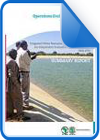Evaluation Team
This report was drafted by Ramesh Adikaru (consultant), Herimandimby Razafindramanana (chief post evaluation officer), reviewed successive drafts of the report.
Objective
This evaluation assesses the relevance of the African Development Bank’s (the Bank’s) 2000 integrated water resources management (IWRM) policy to Regional Member Country (RMC) needs and the Bank’s corporate objectives. It also considers the Bank’s effectiveness in implementing the policy, the results and challenges of policy implementation, and changes to the policy framework and institutional structures for water-related operations in the Bank that could improve implementation and better achieve the goals of IWRM. The evaluation covers 2000–2010 and will inform the revision of the IWRM policy. It was informed by five background papers, and the interviews and consultations with the stakeholders in the Bank and in RMCs
Main Recommendations
Recommendation(s) to the Bank
- The Bank should update its IWRM policy and develop a more focused and concise policy paper clearly stating its priorities in the water sector, covering rural, urban and multinational/transboundary level operations and how an IWRM approach would support the Bank’s strategic orientation toward water for inclusive and green growth and acknowledge water-related challenges such as climate change mitigation and adaptation, urbanization, industrialization, and regional cooperation.
- In order to guide the implementation ofthe policy, the Bank should (i) deepen its approach to cost recovery, by engaging also in strategic policy dialogue with government authorities on this issue; (ii) scale up its support to institutional capacity for IWRM implementation; and (iii) increase its support and approach to transboundary river and lake basin management
- The Bank should adapt resources and the instruments, institutional structures/mechanisms and business processes to the policy goals by:(i) Providing more grant resources to fund analytical work and capacity-building for RMCs and making greater use of programmatic approaches in its lending and grant assistance. (ii) Making its institutional mechanisms more enabling for implementing the policy through increased Bank-wide coordination, collaboration and results monitoring. For example, the Bank should consider the establishment of a cross-department group of Senior Water Experts from OWAS, OSAN, ONEC, OPSM and OSHD. This group would systematically review new sector policies and strategies for water, CSPs, and water-related projects for incorporating IWRM or any other project that may require significant use of water resources at country level. The results of this review could then be communicated to the OpsCom. This group would also be responsible for approving implementation guidelines, fostering knowledge events in the Bank, and coordinating the Bank’s position in international conferences. A panel of external water experts could initially support the group.
- The Bank should develop and implement a corporate-level, medium-term operational strategy for IWRM policy implementation and water-related operations in general. This would be one of the major responsibilities of the interdepartmental coordination group. Measures to support implementation of the IWRM policy should be integrated into a corporate-level operational strategy, bringing together strategies and business plans of all the relevant departments, with a clear business plan detailing key tasks and intended outcomes, the required resources, and monitoring and reporting mechanisms throughout the Bank. Also, donors and shareholders should be invited to provide dedicated resources for IWRM implementation. Monitoring IWRM policy implementation and periodic public reporting on progress would enhance transparency, accountability, and public awareness of the Bank’s work in water-related assistance to RMCs.
- The CSP process of the Bank should be strengthened and used to inform strategic decisions at the country level and be supported by robust water sector diagnostics and other related analytical work. It needs to incorporate water sector diagnostics/assessments, discussion of the Bank’s strategy in water resource management at country and sub-regional levels where appropriate and allocation of resources in accordance with the strategic rationale for the Bank’s involvement. The water assessment should also inform the choice of instruments to best meet the needs of each RMC.
- Bank operations administered by AFW, WPP, and RWSSI (as well as similar initiatives administered by ICA, NEPAD, and PIDA) should also be strategically aligned under the CSP following the ‘One Bank’ approach. This approach could be piloted in a few countries, starting with RMCs where the Bank has already supported IWRM-related activities. It should then fine-tune the approach for implementation in other RMCs.
- The Bank should improve its internal capacities, IWRM knowledge sharing, and incentives and consider a wide range of additionalmeasures to support its IWRM policy implementation, enhance development results and sustainability of the Bank-funded water-related operations, and transform itself into a lead development partner as well as a knowledge bank for the water sector in Africa. In this regard, the Bank should: (i) Consider strengthening internal capacities and skills by providing regular learning events to all staff involved in water-related operations. (ii) Develop and implement a community of practice for water-related operations that brings together water experts from water-related departments at headquarters and field offices for sharing IWRM knowledge in the Bank and in RMCs. This measure would also be useful to address the causes of the weak performance of the Bank-funded projects. Networking with international water institutes, river-based organizations, and multilateral institutions would provide state-of-the-art knowledge in IWRM. (iii) Streamline project preparation and ensure proper attention to sustainability issues of the Bank-funded water-related operations (e.g. maintenance, pricing, costs recovery, demand management, environmental and enabling regulatory environment, local capacity development, and stakeholders’ involvement in project design and implementation.) (iv) Formally recognize and reward Bank staff for their new ideas and excellence in water practices that improve development outcomes of the Bank-funded water-related operations.


